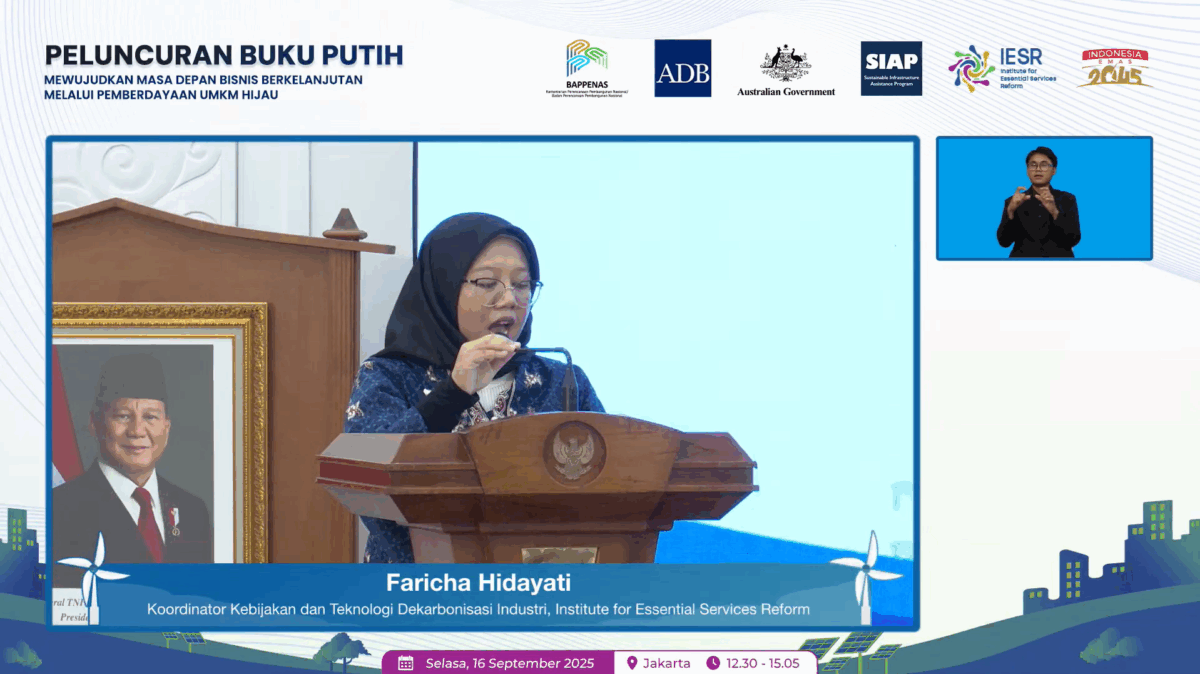Jakarta, September 16, 2025 – Micro, Small, and Medium Enterprises (MSMEs) are the backbone of the Indonesian economy, contributing more than 60% to Gross Domestic Product (GDP) and absorbing up to 97% of the workforce. Despite its significant economic contribution, the MSME sector also contributes to high greenhouse gas emissions, amounting to approximately 216 million tons of CO2 in 2022, nearly two-thirds of national industrial emissions.
Transforming to green business is a necessity. This was conveyed by the Deputy Minister of the National Development Planning Agency (Bappenas), Febrian A. Ruddyard, at the launch of the White Paper “Realizing a Sustainable Business Future Through Green MSME Empowerment,” organized by the Ministry of National Development Planning/Bappenas, the Ministry of MSMEs, in collaboration with the Asian Development Bank (ADB), with support from the Australian Government through the Sustainable Infrastructure Assistance Program Phase 2 (SIAP2), and the Institute for Essential Services Reform (IESR).
“If MSMEs successfully transform into green businesses, our projection is that the economy will grow by more than 600 trillion rupiah by 2030, and 4 million green jobs will be created. This way, Indonesia’s NZE can be achieved more quickly,” said Febrian.
Faricha Hidayati, Coordinator of Industrial Decarbonization Policy and Technology, IESR, explained that this White Paper contains an analysis of the current situation, a transformation roadmap, policy recommendations, and implementable steps to accelerate the adoption of green practices by MSMEs throughout Indonesia.
“The launch of this White Paper is a strategic opportunity to convey policy messages, encourage collaboration, and strengthen cross-stakeholder commitments so that Indonesian MSMEs are ready to compete in a global market that increasingly demands sustainability,” she said.
Lishia Erza, the White Paper’s author team, stated that the potential economic value generated if even a portion of MSMEs transformed into green businesses could reach hundreds of trillions of rupiah.
Lishia added that the informal sector, which is part of Indonesia’s MSME ecosystem, contributes 36% of GDP, or around USD 500 billion. According to her, a 10% transformation of the informal sector is estimated to create a green economic value of 798 trillion rupiah.
“If we successfully transform 20%, the (green) economic value will be 1,596 trillion rupiah. In the most optimistic scenario, where we transform 30% of MSMEs into green businesses, we achieve a green economic value of 2,390 trillion-rupiah, equivalent to the GDP of ASEAN countries like Vietnam or the Philippines,” said Lishia.
On the other hand, market demand for low-emission products is growing, as stated by Ratih Purbasari Kania, Director of Natural Resources Planning and Manufacturing Industry at the Ministry of Investment and Downstream Investment Coordinating Board (BKPM).
“To facilitate businesses in transforming their businesses, we have compiled a Sustainable Investment Guide containing 25 indicators and covering four aspects. This guide can be used by business actors, investors, and the government to encourage green business transformation,” explained Ratih.
Novita Tan, CEO of Rebricks, shared the perspective of a business owner, noting that while regulations related to green business continue to emerge, some aspects, such as standardization, remain quite complex, especially if the target market is exports.
“One of our experiences is that although there are quite a lot of standardizations in Indonesia, none of them are comparable to the standards of our export destination countries,” said Novita.

